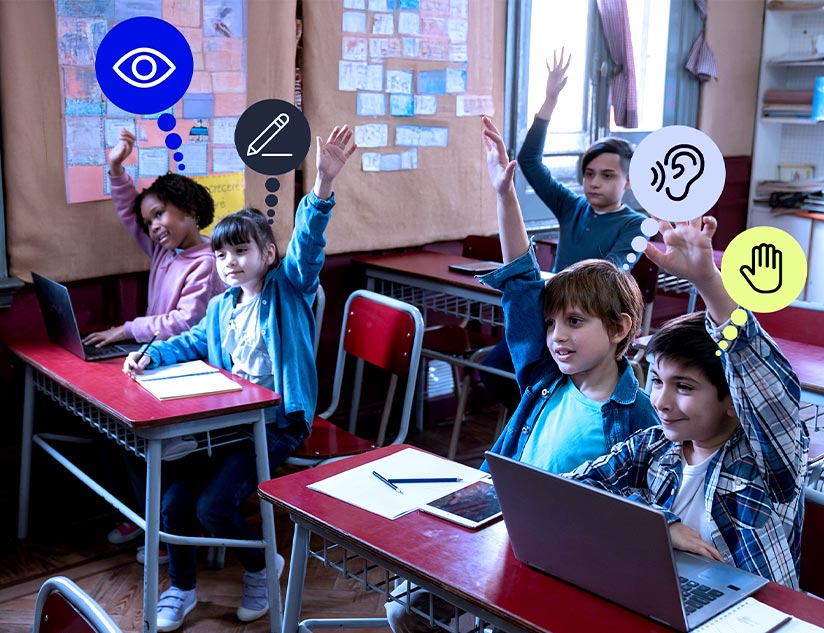The Education 4.0 Alliance identifies 4 areas where AI can have a profound impact. These include supporting teachers, refining assessments and analytics, improving inclusion and digital literacy, and enabling educators to deliver personalized learning experiences. Globally, the personalization culture has taken the front seat to offer tailored experiences to all kinds of users. However, AI in education goes much beyond that to enable educators to comply with DEIJ requirements through tailored learning materials and assessments.
Diversity in Learning Styles
Offering inclusive education requires addressing the unique needs of every student. From diverse learning paces to preferred skill and knowledge acquisition modes, educational publishers must cater to all needs. Language and cultural differences among teachers and students must also be addressed with adequate recommendations in real-time to enable educators to adjust the pedagogy. Additionally, learning journeys must adapt to the needs of visually or hearing impaired learners and those with learning disabilities to truly offer equitable learning opportunities.
However, certain challenges restrict educational publishers from doing so, such as:
- Inadequate knowledge of the preferences of the target cohort.
- Lack of tools to create culturally sensitive learning resources.
- Absence of adequate tools to adapt content to learner needs.
- Insufficient technical expertise in or psychological blocks to integrating AI-driven platforms.
Leveraging AI for Personalization in Learning
Personalized learning is known to boost learning outcomes since tutored students outperform 98% of their untutored peers in classroom settings. Leveraging AI in education can help educational publishers offer tailored learning to all types of learners. AI personalization involves offering students the right learning resources that align with their learning goals, styles, and current level. AI-driven digital learning platforms dynamically adjust learning journeys, using flexible course modules and diverse instruction formats, to meet the needs of individual students. Digital learning platforms equipped with AI learning assistants offer real-time support, answering questions and taking care of text-to-speech conversions and vice-versa, to assist learners in the absence of a teacher. The 24/7 availability facilitates friction-free learning anytime, any place.
AI-Powered Analytics Drive Better Outcomes
AI-driven learning analytics platforms offer significant advantages for educational publishers.
Insights into Content Quality
AI-powered solutions for publishers offer deeper insights into engagement levels and performance of their learning materials. These insights can be used to improve instruction and assessment quality to enhance academic achievement. AI-driven content authoring platforms offer recommendations to tailor content to learning needs and accelerate course creation times.
Bridging Learning Gaps
Digital learning platforms that leverage AI in education assess individual learning journeys and outcomes to identify the strengths and weaknesses of each learner. This is extremely helpful in bridging learning gaps with adequate supplementary resources. Predictive analytics support the identification of students who are likely to fail or drop out, flagging the need for immediate intervention. Automated grading with AI-grading assistants offers immediate student feedback and accelerates learning improvement with instant recommendations.
Real-Time Instruction Alignment
Powerful analytics assess teaching mechanisms in real-time to offer dynamic teaching suggestions to tailor the learning journey, content, and/or instruction mechanism to better meet the learner’s needs. For instance, a teacher demonstrating a visual aid in a classroom with a visually impaired student can be recommended to turn on audio assistance to ensure that the student does not miss out on anything.
AI Solutions for Publishers Offer Content Recommendations
The proliferation of remote and hybrid classrooms has created the need for educators to culturally and linguistically align content to student needs. This ensures that students remain actively engaged with the content and education delivery is equitable. AI-enabled learning platforms also facilitate the personalization of learning journeys and content. Educators can set learning goals based on learners’ current levels, while AI tools can offer targeted reading lists, assessments, and study plans to achieve the desired learning outcomes. AI learning assistants also help learners by answering their questions and suggesting relevant supplementary materials to enhance skill and knowledge acquisition.
Embrace AI for a Competitive Advantage
In the rapidly evolving and globalizing learning ecosystem, differentiating your digital platform is crucial for business success. AI-driven platforms empower you to future-proof content delivery. Integrating AI solutions across the learning ecosystem is increasingly becoming a business imperative for publishers and edtech providers. Ensuring compliance with regulations while creating inclusive and accessible learning environments is also essential for adoptions. Comprehensive and compliant AI solutions for publishers that assist in content authoring and distribution, learning management, ongoing improvement, and demonstrating evidence of success are critical to win RFPs.
MagicBox™’s innovative tools are set to revolutionize course development and learning experiences with the power of predictive and generative AI. The learning assistant, KEA, doubles as a study partner. AI tools in the digital learning platform also simplify course, assessment, assignment, and summary creation, reducing the time and effort needed by publishers to create or update their offerings. Speak to the experts to discover how MagicBox™ leverages AI in education to position you at the forefront of innovation and state adoptions.














